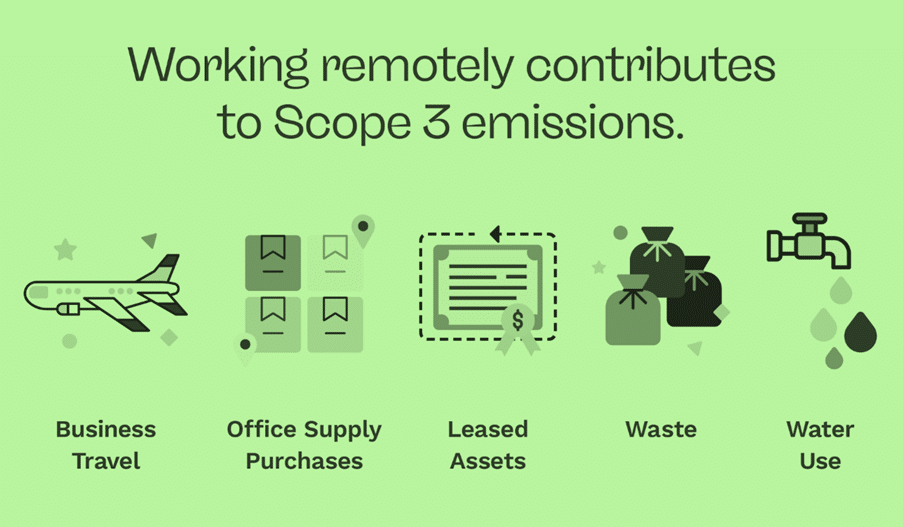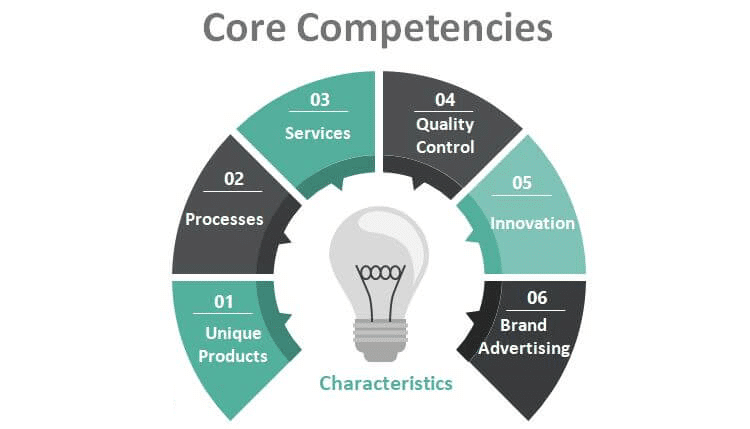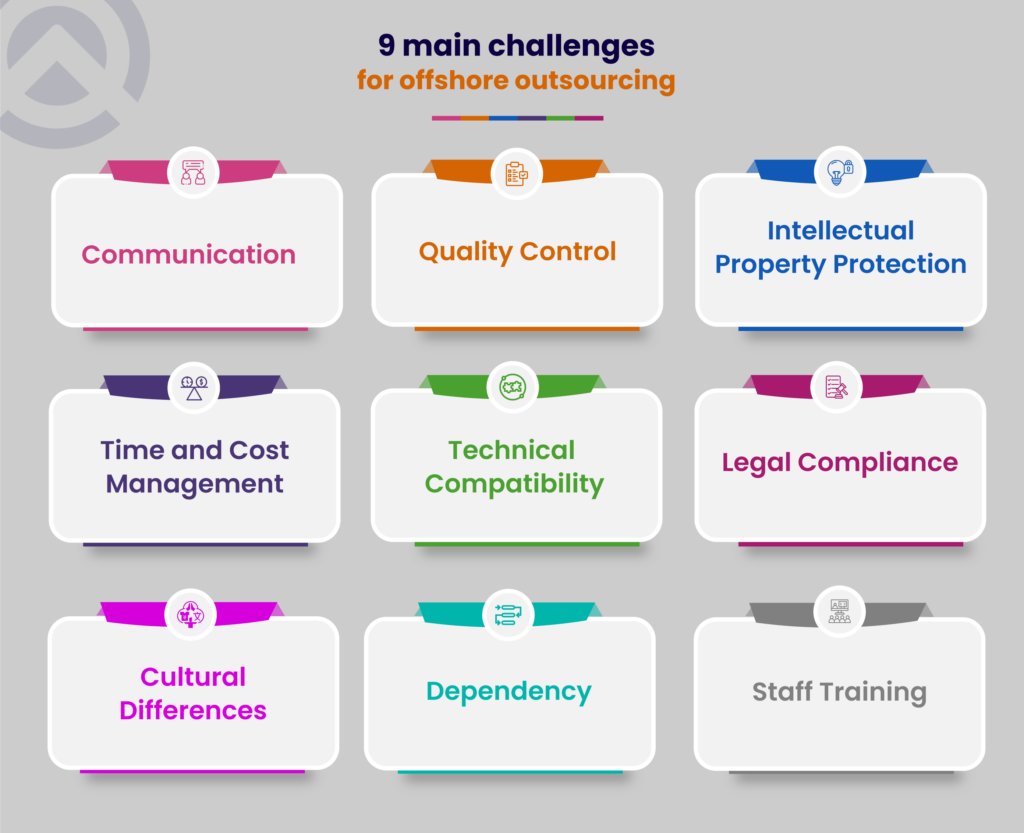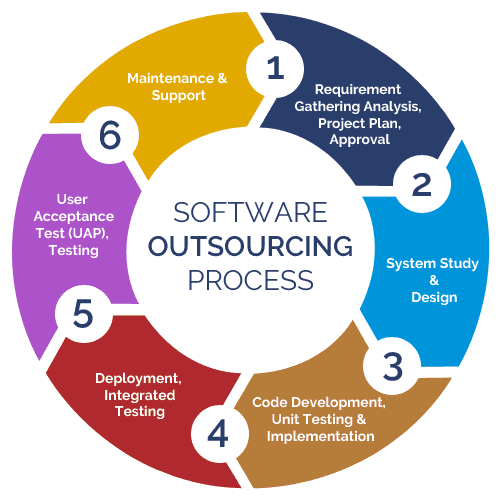How to Outsource App Development in 2023 – Crucial Factors
Application development outsourcing is considered as an ideal solution for companies because of its immense benefits. Mobile app outsourcing company are evolving and after COVID-19 remote developing industries gain astonishing upwards growth.
In this decade, remote working options have evolved and many employees are prioritizing various options to work remotely. Similarly, companies are also searching for remote agencies that can create digital products (such as: app or web) instead of hiring in-house team members.
As, per the official report of Grand View Research, it can be analyzed that global mobile app development outsourcing is expected to grow at a CAGR of 9.4% CAGR from 2023 to 2030. Now, it’s time to dive into this article to gain all the crucial information that you need to know before outsourcing your app development process.
What Pushed the Remote Working Sector to Evolved?
The remote working sector has experienced a significant evolution in recent years, and several factors have contributed to this transformation. Let’s explore some of the key drivers that have propelled the growth of remote work:
Reason 1: Advancement in Technology
Advancements in technology have played a crucial role in enabling remote work. With the rise of cloud computing, high-speed internet, and powerful mobile devices, it has become increasingly feasible to work from anywhere in the world.
These technological developments have created new opportunities for businesses to operate remotely and have opened up access to global talent pools.
Reason 2: Emerging of New Practices After COVID-19
Shifting attitudes towards work have also played a significant role in the growth of remote work. Many professionals now prioritize work-life balance and flexibility over traditional office-based work.
As a result, remote work has become an attractive option for workers seeking a better balance between work and personal life. Additionally, the COVID-19 pandemic has accelerated this trend, as many organizations have had to adopt remote work policies to keep employees safe.

Reason 3: Acceptance of Remote Work
Remote work has become more widely accepted and recognized as a viable alternative to traditional office-based work. More companies are embracing remote work policies as they recognize the benefits it offers, such as cost savings, increased productivity, and access to a broader talent pool.
This increased acceptance of remote work has also led to the development of better remote work tools and resources, such as video conferencing platforms, virtual collaboration software, and project management tools, which are particularly useful for those involved in app design outsourcing and app development outsourcing.
Reason 4: Rise of the GIG Economy
Many workers now prefer to work on a freelance or contract basis, and remote work offers a way to do so. This has created opportunities for businesses to hire skilled professionals on a project-by-project basis, without the need for a long-term commitment.
Reason 5: Demographic Changes
As the workforce becomes increasingly diverse, companies are recognizing the importance of accommodating different working styles and preferences. Remote work offers a way to cater to these diverse needs and attract a wider range of talent.
Overall, an outsourcing model with remote workers can be a winning combination for businesses looking to expand their capabilities and stay ahead of the competition.
Companies can access a vast pool of skilled professionals who can help them bring their ideas to life. Remote work also provides the flexibility needed to collaborate across time zones and deliver projects on time.
Reason 6: Consciousness Towards Environment
As businesses become more conscious of their environmental impact, if you decided to outsource your mobile app development process then it can help reduce carbon emissions and promote sustainability by enabling companies to take advantage of remote work. By allowing employees to work from home, companies can reduce the need for commuting and office space, leading to a lower carbon footprint.

Empower Your Business By Knowing Outsourcing App Development Advantages
By outsourcing app development, companies can tap into the expertise of skilled professionals from around the world, who can bring fresh ideas and perspectives to their projects.
There are various benefits of outsourcing and we have prepared a list of advantages that you can avail by simplifying shifting from the traditional method of operations to outsourcing models.
A. Save Up To 60% Cost
By outsourcing, companies can save on the cost of hiring in-house developers, as well as the cost of maintaining infrastructure and equipment. For example: suppose, you want to create a mobile application for your transportation business. You analyzed that you require at-least 20 in-house team members to develop a mobile application.
In this case, if you will conduct a financial analysis by comparing the cost involved among in-house team members and the outsourcing model. Then, you can estimate that by outsourcing your current process you are able to save up-to 60% on operational costs.
B. Faster Time to Market
By outsourcing, companies can save on the cost of hiring in-house developers, as well as the cost of maintaining infrastructure and equipment. By leveraging the expertise of skilled professionals, businesses can develop and deliver high-quality apps quickly. This is especially important in today’s fast-paced business environment where time to market can be critical to success.
C. Speed of Operations
Outsourcing app development can potentially increase the speed of operations for your work. By outsourcing certain tasks, you can tap into the expertise of skilled professionals who specialize in specific areas. This can lead to faster completion of tasks and projects, as these professionals have the necessary knowledge and tools to get the job done efficiently.
Additionally, outsourcing can provide you with greater flexibility to scale up or down quickly, allowing you to manage your resources more effectively and speed up your operations. However, it’s important to note that the speed of operations can depend on a variety of factors, including the complexity of the tasks being outsourced and the quality of the professionals hired.
D. Get Time to Focus on your Core Competencies

By outsourcing non-core tasks, companies can free up time, resources, and personnel to concentrate on activities that are more closely aligned with their core competencies. For example, a software development company might outsource its payroll processing, customer support, or marketing functions, which are not directly related to the development of software.
By doing so, the company can focus on its core strengths, such as software development, and invest more time and resources into enhancing its products and services, improving customer satisfaction, and increasing its market share. In addition, outsourcing can help companies to reduce costs, improve operational efficiency, and access specialized skills and expertise that may not be available in-house.
Overall, outsourcing can be a valuable strategy for businesses looking to optimize their operations and focus on what they do best. By leveraging the expertise of third-party service providers, companies can gain a competitive edge in their industry, improve their bottom line, and ultimately achieve greater success.
E. Innovative Ideas & 3rd Party Perspective
When you decide to go with the outsource app development then you can get the 3rd party perspective toward your existing ideas. Getting the 3rd party perspective helps you to decide whether you should execute a specific idea or not?
Although, many reliable outsourcing companies present at-leat 10 to 12 specific ideas that can be beneficial for your process. So, in such cases, you get a plethora of opportunities to evaluate about which specific ideas that can be suited better for your business.
You can even consult with the outsourcing agency to adopt the approach as your existing business module. So, to get the perspective of the external parties you can give a choose to adopt the outsourcing models.
Challenges of Outsourcing App Development

Communication: Effective communication is critical for successful outsourcing, but it can be challenging when dealing with teams in different time zones and cultural backgrounds.
Quality Control: Maintaining the quality of the final product can be a challenge when outsourcing app development, as it can be difficult to monitor progress and ensure adherence to specifications.
Intellectual Property Protection: Protecting intellectual property can be a major concern when outsourcing app development, as it can be difficult to ensure that the third-party vendor does not use or share sensitive information.
Time and Cost Management: Managing time and costs can be difficult when outsourcing app development, as it requires effective planning and coordination to ensure that deadlines are met and budgets are not exceeded.
Technical Compatibility: Vendor’s technology is compatible with the company’s systems can be a challenge, as it may require additional resources and time to ensure seamless integration.
Legal Compliance: Ensuring that outsourcing vendors comply with legal requirements can be a challenge, particularly when dealing with vendors in different countries with varying regulations and standards.
Cultural Differences: Cultural differences can impact outsourcing relationships, particularly in terms of communication, decision-making processes, and business practices.
Dependency: Outsourcing can create dependency on third-party vendors, which can be a risk if the vendor is no longer able to provide services or if the company becomes overly reliant on the vendor for critical functions.
Staff Training: Providing training to staff to work with the outsourced vendor can be a challenge, particularly if staff is located in different regions or has varying levels of technical expertise.
In-House Team vs Offshore Mobile App Development
In-house mobile app development teams work directly within the company’s premises, allowing for close collaboration between developers and other departments. This enables swift communication and quick decision-making.
Companies have full control over the development process and can ensure the quality of the product. However, in-house teams require significant investment in terms of hiring and retaining skilled professionals, infrastructure, and resources.
Offshore mobile app development involves outsourcing the development process to a third-party vendor located in another country. This approach can offer cost savings, as labor and overhead expenses may be lower in other regions.
However, communication challenges may arise due to language barriers and differences in time zones. There may also be differences in culture and work practices that can affect the project’s outcome.
Choosing between in-house and offshore mobile app development depends on various factors, such as the project’s complexity, the company’s budget, and the timeline.
In-house development may be suitable for projects that require close coordination between departments or involve sensitive data. Offshore development can be an option for companies that prioritize cost savings and can manage communication challenges effectively.
Companies should carefully evaluate the pros and cons of each approach before making a decision. Both in-house and offshore mobile app development have their advantages and disadvantages, and it is essential to weigh these factors against the company’s specific needs and goals.
Comparison Between In-house Team Versus Offshore Mobile App
| Factors To Consider | In-House Team | Offshore Mobile App |
Control | In-house teams provide companies with full control over the development process, ensuring the quality of the product. | Offshore development, on the other hand, can result in less control over the development process, as companies rely on a third-party vendor. |
Communication | In-house teams allow for close collaboration between developers and other departments, enabling swift communication and quick decision-making. | Offshore development can pose communication challenges due to language barriers, time zone differences, and cultural differences. |
Expertise | In-house teams allow for close collaboration between developers and other departments, enabling swift communication and quick decision-making. In-house teams require significant investment in terms of hiring and retaining skilled professionals, infrastructure, and resources. | Offshore development can offer access to a broader pool of talent and expertise, as vendors may have specialized knowledge and experience. |
Cost Factor | In-house teams involve significant costs related to hiring, training, and retaining skilled professionals, as well as maintaining infrastructure and resources. | The outsourced app development process offers cost savings due to lower labor and overhead expenses in other regions. |
Security Factor | In-house teams may be suitable for projects that involve sensitive data or require close coordination between departments. | Outsource mobile app development can pose security risks, as companies may have less control over the handling of their data by third-party vendors. |
Timeframe | In-house teams can work on projects with flexible timelines. | While offshore development may involve longer development times due to communication challenges and time zone differences. |
Key Indications of a Reliable Application Development Outsourcing Company

A reliable application development outsourcing company should have extensive experience, skilled professionals, clear communication channels, prioritize quality and timeliness, be flexible, prioritize security, have references and offer transparent pricing.
Companies looking to outsource their mobile app development should carefully evaluate potential vendors based on these key indicators to ensure that they choose a reliable and trustworthy partner.
- Experience: A reliable outsourcing company should have extensive experience in developing mobile apps for various industries and platforms. They should have a portfolio that demonstrates their expertise and the quality of their work.
- Skilled Professionals: It should be a team of skilled professionals with expertise in different areas, such as UX/UI design, development, quality assurance, and project management.
- Communication Strategies: A reliable outsourcing company should have open and clear communication channels to ensure that the project’s progress is transparent and any issues are addressed promptly. They should be responsive to client queries and concerns.
- Quality: They should prioritize quality in all aspects of the development process, from design to testing and deployment. They should have a well-defined quality assurance process and use the latest tools and technologies to ensure high-quality results.
Other Factors
- Timeliness: A reliable outsourcing company should deliver projects on time and within budget. They should have a well-defined project management process that ensures that the project stays on track, and any delays or issues are communicated promptly.
- Flexibility: They should be able to adapt to changes in project scope or requirements. They should be willing to collaborate with clients and adjust their approach to meet the client’s needs.
- Security: Prioritize data security and have measures in place to protect client data. They should follow best practices for data protection and be willing to sign a non-disclosure agreement to protect confidential information.
- References: Need to have references from previous clients that can vouch for their expertise, professionalism, and quality of work. They should be willing to provide references upon request.
- Pricing: It should offer transparent and competitive pricing for its services. They should provide detailed project estimates that outline the scope of work and the associated costs.
Read more: How to Outsource Website Development in 2023
Steps to Select the Outsourcing Vendor – How to Pick the Best One?
Choosing the best vendor for outsourcing can be a complex process, but here are some steps you can take to make the selection process more manageable.
Step 1: Define Project Requirements
Defining your project requirements before assigning the contract to any outsourcing company is crucial to ensure that the vendor you choose can deliver the project as per your expectations. For example: if you’re looking for app development outsourcing in India, you need to define your project requirements clearly, including the scope of work, the expected timeline, and the budget.
By defining your project requirements, you can evaluate potential outsourcing companies based on their expertise in mobile app development, their experience with social networking apps, and their ability to work on both iOS and Android app platforms.
Step 2: Search For Potential Vendors
Once you have defined your project requirements, you can start researching potential vendors. Look for companies that have experience in your industry and have completed similar projects in the past. You can find potential vendors through online directories, referrals, or by attending industry events.
It is suggested that you can take use of “Linkdln” for searching for the vendors. You can check their profile to evaluate their digital presence as well as their infrastructure. Apart from this, you can take use of the below-suggested measures –
- Use Online Directories: You can use online directories such as Clutch, GoodFirms, or Upwork to search for potential vendors. These directories list vendors based on their expertise and client ratings.
- Attend Industry Events: Attend industry events such as trade shows or conferences to network with potential vendors. This is an opportunity to meet vendors face-to-face and learn more about their services.
- Referrals: Ask for referrals from colleagues or other business owners who have outsourced similar projects. Referrals can help you find vendors who have a proven track record of delivering high-quality services.
- Use Search Engines: Use search engines such as Google or Bing to search for potential vendors. For example, if you’re looking for mobile app development outsourcing, you can search for “mobile app development outsourcing companies.”
- Social Media: Use social media platforms such as LinkedIn or Twitter to search for potential vendors. You can search for vendors based on their location, expertise, or industry.
You can even search in India for potential outsourcing vendors. Many global MNCs already have their operations in this country. So, you can also decide to outsource your app development to India after searching for a profound vendor.
Step 3: Evaluate Vendor’s Portfolio
Evaluating a vendor’s portfolio is an essential step in selecting an outsourcing partner for your project. For example, if you’re looking for a vendor for mobile app development outsourcing, you can evaluate the vendor’s portfolio by looking at their previous projects.
Suppose a potential vendor has a portfolio that includes developing mobile apps for different industries such as healthcare, e-commerce, and gaming. You can evaluate their portfolio by looking at the functionality, user interface, and overall design of their apps. You can also look at the ratings and reviews of their apps on app stores to see how users have responded to their work.
Another aspect to consider when evaluating a vendor’s portfolio is the technology stack they use. For instance, if you’re looking for a vendor for mobile app development outsourcing, you can evaluate their portfolio to see if they have experience working with the latest technologies and platforms – such as: React Native, Kotlin, or Swift.
By evaluating a vendor’s portfolio, you can also gain insight into their development process and project management skills. For example, you can look for indicators of agile development methodologies, such as iterative design, continuous testing and regular client communication.
Step 4: Check For References
Ask for referrals from colleagues or other business owners who have outsourced similar projects. Referrals can help you find vendors who have a proven track record of delivering high-quality services.
Step 5: If you want then you can even take the interview of outsourcing company’s candidates
After reviewing portfolios and references, you can conduct interviews with potential vendors. This is an opportunity to ask questions about their approach to project management, their team’s expertise, and their ability to work within your budget and timeline.
Read about: In-house Developers or Outsourcing
Step 6: Review Proposals
This is a critical step and there are some primary factors that you need to consider while reviewing the proposal by the vendor:
- Evaluate their understanding of your project: Review the vendor’s proposal to ensure that they have a clear understanding of your project requirements. Check if their proposal addresses all the key aspects of your project and if they have provided a clear roadmap for project execution.
- Check their pricing and delivery schedule: Review the vendor’s pricing and delivery schedule to ensure that they align with your budget and timeline. Look for any hidden costs or charges that may affect your project’s overall cost. As outsourcing app development India cost will be lower and Indians also incorporate profound knowledge of the latest global technologies.
Note: before the final selection of the outsource app development, you can negotiate about prices. This will help you to reduce the outsource app development cost in an effective way.
Step 7: Final Selection Stage
Once you have reviewed the proposals, you can make your selection based on the vendor’s experience, portfolio, references, and proposal. Make sure to clarify the terms of the contract and establish clear communication channels before starting the project.
Connect With Amplework For Outsource Mobile App Process
Amplework Software is a leading provider of outsourcing services, specializing in mobile app development outsourcing. We help businesses of all sizes and industries to achieve their goals by providing end-to-end solutions tailored to their unique needs.
We ensure transparent communication and project management throughout the outsourcing process. We provide regular updates on project progress and address any concerns. At Amplework, our goal is to help our clients succeed by providing reliable and effective outsourcing services.


 sales@amplework.com
sales@amplework.com
 (+91) 9636-962-228
(+91) 9636-962-228





